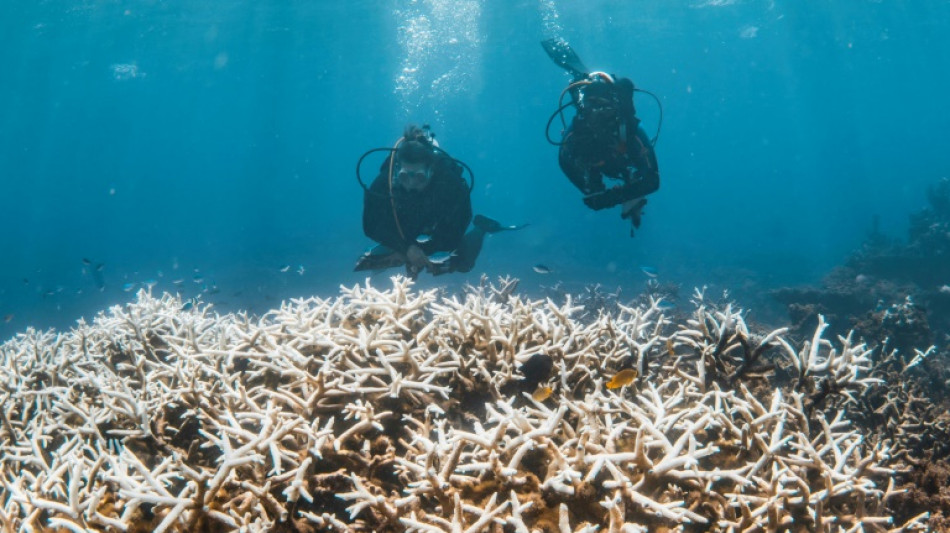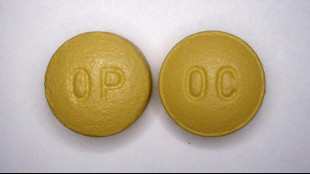
-
 England captain Itoje savours 'special' New Zealand win
England captain Itoje savours 'special' New Zealand win
-
Wales's Evans denies Japan historic win with last-gasp penalty

-
 Zelensky renews calls for more air defence after deadly strike on Kyiv
Zelensky renews calls for more air defence after deadly strike on Kyiv
-
NBA's struggling Pelicans sack coach Willie Green

-
 Petain tribute comments raise 'revisionist' storm in France
Petain tribute comments raise 'revisionist' storm in France
-
Spain on World Cup brink as Belgium also made to wait

-
 Spain virtually seal World Cup qualification in Georgia romp
Spain virtually seal World Cup qualification in Georgia romp
-
M23, DR Congo sign new peace roadmap in Doha

-
 Estevao, Casemiro on target for Brazil in Senegal win
Estevao, Casemiro on target for Brazil in Senegal win
-
Ford steers England to rare win over New Zealand

-
 Massive march in Brazil marks first big UN climate protest in years
Massive march in Brazil marks first big UN climate protest in years
-
Spain rescues hundreds of exotic animals from unlicensed shelter

-
 Huge fire sparked by explosions near Argentine capital 'contained'
Huge fire sparked by explosions near Argentine capital 'contained'
-
South Africa defy early red card to beat battling Italy

-
 Sinner beats De Minaur to reach ATP Finals title match
Sinner beats De Minaur to reach ATP Finals title match
-
Zelensky vows overhaul of Ukraine's scandal-hit energy firms

-
 South Africa defy early red card to beat Italy
South Africa defy early red card to beat Italy
-
Alex Marquez claims Valencia MotoGP sprint victory

-
 McIlroy shares lead with Race to Dubai title in sight
McIlroy shares lead with Race to Dubai title in sight
-
Climate protesters rally in Brazil at COP30 halfway mark

-
 Spike Lee gifts pope Knicks jersey as pontiff meets film stars
Spike Lee gifts pope Knicks jersey as pontiff meets film stars
-
BBC caught in crossfire of polarised political and media landscape

-
 'Happy' Shiffrin dominates in Levi slalom for 102nd World Cup win
'Happy' Shiffrin dominates in Levi slalom for 102nd World Cup win
-
Palestinian national team on 'mission' for peace in Spain visit

-
 Brazilian 'Superman' cheers child cancer patients in Ghana
Brazilian 'Superman' cheers child cancer patients in Ghana
-
India close in on win over South Africa after Jadeja heroics

-
 Huge explosions rock industrial area near Argentina's capital
Huge explosions rock industrial area near Argentina's capital
-
Bezzecchi takes pole for Valencia sprint and MotoGP

-
 Dominant Shiffrin leads after first slalom run in Levi
Dominant Shiffrin leads after first slalom run in Levi
-
Nine killed in accidental explosion at Indian Kashmir police station

-
 Climate protesters to rally at COP30's halfway mark
Climate protesters to rally at COP30's halfway mark
-
Fighting South Africa lose Rickelton after India 189 all out

-
 Harmer leads South Africa fightback as India 189 all out
Harmer leads South Africa fightback as India 189 all out
-
Prison looms for Brazil's Bolsonaro after court rejects his appeal

-
 EU bows to pressure on loosening AI, privacy rules
EU bows to pressure on loosening AI, privacy rules
-
India close in on lead despite South African strikes

-
 Curry's 49 points propel Warriors in 109-108 win over Spurs
Curry's 49 points propel Warriors in 109-108 win over Spurs
-
NZ boxer Parker denies taking banned substance after failed test

-
 Australia setback as Hazlewood ruled out of 1st Ashes Test
Australia setback as Hazlewood ruled out of 1st Ashes Test
-
Australia pace spearhead Josh Hazlewood ruled out of 1st Ashes Test

-
 UN Security Council to vote Monday on Trump Gaza plan
UN Security Council to vote Monday on Trump Gaza plan
-
Japan's Tomono leads after men's short program at Skate America

-
 China tells citizens to avoid Japan travel as Taiwan row grows
China tells citizens to avoid Japan travel as Taiwan row grows
-
Purdue Pharma to be dissolved as US judge says to approve bankruptcy

-
 Iran's first woman orchestra conductor inspires
Iran's first woman orchestra conductor inspires
-
Wood gets all-clear in boost for England

-
 Golf's world No. 8 Thomas has back surgery
Golf's world No. 8 Thomas has back surgery
-
Rebooted Harlem museum celebrates rise of Black art

-
 'Desperation in the air': immigrant comics skewer Trump crackdown
'Desperation in the air': immigrant comics skewer Trump crackdown
-
UN regulator says shipping still wants to decarbonize -- despite US threats


In a hotter future, what comes after coral reefs die?
The fate of coral reefs has been written with a degree of certainty rare in climate science: at 1.5 degrees Celsius of global warming, most are expected to die.
This is not a far-off scenario. Scientists predict that the rise of 1.5 Celsius (2.7 Fahrenheit) will be reached within a decade and that beyond that point, many coral simply cannot survive.
It is important to accept this and ask what next "rather than trying to hold onto the past", said David Obura, chair of IPBES, the UN's expert scientific panel on biodiversity.
"I wish it were different," Obura, a Kenyan reef scientist and founding director of CORDIO East Africa, a marine research organisation, told AFP.
"We need to be pragmatic about it and ask those questions, and face up to what the likely future will be."
And yet, it is a subject few marine scientists care to dwell on.
"We are having a hard time imagining that all coral reefs really could die off," said Melanie McField, a Caribbean reef expert, who described a "sort of pre-traumatic stress syndrome" among her colleagues.
"But it is likely in the two-degree world we are rapidly accelerating to," McField, founding director of the Healthy Reefs for Healthy People Initiative, told AFP.
When stressed in hotter ocean waters, corals expel the microscopic algae that provides their characteristic colour and food source. Without respite, bleached corals slowly starve.
At 1.5C of warming relative to pre-industrial times, between 70 and 90 percent of coral reefs are expected to perish, according to the IPCC, the global authority on climate science.
At 2C, that number rises to 99 percent.
Even with warming as it stands today -- about 1.4C -- mass coral death is occurring, and many scientists believe the global collapse of tropical reefs may already be underway.
- What comes next -
Obura said it was not pessimistic to imagine a world without coral reefs, but an urgent question that scientists were "only just starting to grapple with".
"I see no reason to not be clear about where we are at this point in time," Obura said. "Let's be honest about that, and deal with the consequences."
Rather than disappear completely, coral reefs as they exist today will likely evolve into something very different, marine scientists on four continents told AFP.
This would happen as slow-growing hard corals -- the primary reef builders that underpin the ecosystem -- die off, leaving behind white skeletons without living tissue.
Gradually, these would be covered by algae and colonised by simpler organisms better able to withstand hotter oceans, like sponges, mussels, and weedy soft corals like sea fans.
"There will be less winners than there are losers," said Tom Dallison, a marine scientist and strategic advisor to the International Coral Reef Initiative.
These species would dominate this new underwater world. The dead coral beneath -- weakened by ocean acidification, and buffeted by waves and storms -- would erode over time into rubble.
"They will still exist, but they will just look very different. It is our responsibility to ensure the services they provide, and those that depend on them, are protected," Dallison said.
- Dark horizon -
One quarter of all ocean species live among the world's corals.
Smaller, sparser, less biodiverse reefs simply means fewer fish and other marine life.
The collapse of reefs threatens in particular the estimated one billion people who rely on them for food, tourism income, and protection from coastal erosion and storms.
But if protected and managed properly, these post-coral reefs could still be healthy, productive, attractive ecosystems that provide some economic benefit, said Obura.
So far, the picture is fuzzy -- research into this future has been very limited.
Stretched resources have been prioritised for protecting coral and exploring novel ways to make reefs more climate resilient.
But climate change is not the only thing threatening corals.
Tackling pollution, harmful subsidies, overfishing and other drivers of coral demise would give "the remaining places the best possible chance of making it through whatever eventual warming we have", Obura said.
Conservation and restoration efforts were "absolutely essential" but alone were like "pushing a really heavy ball up a hill, and that hill is getting steeper", he added.
Trying to save coral reefs "is going to be extremely difficult" as long as we keep pouring carbon into the atmosphere, said Jean-Pierre Gattuso, an oceans expert from France's flagship scientific research institute, CNRS.
But some coral had developed a level of thermal tolerance, he said, and research into restoring small reef areas with these resilient strains held promise.
"How do we work in this space when you have this sort of big dark event on the horizon? It's to make that dark event a little brighter," said Dallison.
S.Abdullah--SF-PST



